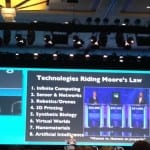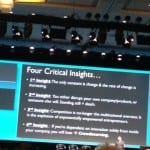You think your world is big. Then you travel and realise it’s small. You think you’re open to new ideas and ways of being. Then you come face to face with the future and realise how little you know.
At last year’s Blackboard World Conference, the closing keynote was given by Geoffrey Canada. I thought it would be a hard act to follow but Blackboard managed it. Peter Diamandis (XPrize Foundation, Singularity U and much, much more) called his talk Innovation and Disruption on the Road Ahead. Opening up to how exponential technologies are changing our lives – now as well as in the future – this video from YouTube is an example.
In the book Abundance, Diamandis includes the development of AI by the name of Watson. Like millions of others, I watched Watson play and win Jeopardy.
That was four years ago. Today Watson has moved on from downloading Wikipedia and is now on the cloud, moving into medicine. The plan is a partnership with medics so they no longer need to memorise a mass of information but can ask Watson instead.
We’re told the difference between Watson and Google is Google offers information, while Watson represents knowledge. Soon everyone will be able to connect to Watson via a mobile phone. How scary is that! What are the safeguards Hal? What will this mean for the future of higher education?
We are living in a world of perfect knowledge. A data driven world. LEO satellite constellations orbit the earth, watching and recording. Drones are getting smaller; more inconspicuous, anonymous and disposable. Google cars carry a LIDAR device on their roof to gather and interpret data. There is no such thing as privacy. Diamandus tells us robotics will displace 48% workforce. Will they displace me? What will happen to art and creativity? Only a few weeks ago the Guardian ran a piece on the neural networks of software; Yes, androids do dream of electric sheep
3D printing is turning abstract ideas into concrete realities in 300 different materials. How many more will be available by next week, month, year?
3D cars have been printed.
In China, Winsun have printed 3D houses.
Biometric devices like the Google contact lens can test glucose levels in tears for diabetics.
Virtual Reality is the next educational revolution. Oculus have been bought by Facebook. The future is Microsoft Windows Holographics where the virtual and the real come together.
This is not science fiction. It is already fact.
If this is what we know, how much more don’t we know? Where does this leave virtual learning environments like Blackboard and the traditional ideas of school, college and university – already being challenged by the internet.
BBWorld15 offered extremes. On the one side Diamandis tells us to disrupt before we are disrupted, while on the other presentations called for attention of digital divides.
99% of the conference involved 3000 delegates sitting and passively listening. We might have the technology but how much difference is it really making to way we operate, in particular within the educational sector? More thoughts on this in BBWorld15 Part Two.


